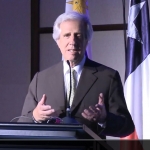Science of Peace Award Lecture
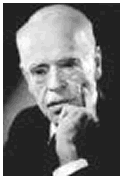
Dr. Paul Dudley White
The “InterAmerican Heart Foundation Science of Peace Award Lecture” is an invited lecture series that honors the work of Dr. Paul Dudley White of the United States and Dr. René Favaloro of Argentina. Both recognized the societal causes and implications of cardiovascular disease control and prevention. They saw health as a human right and paid attention to the social and economic context in which cardiovascular disease occurs.

Dr. René Favaloro
Dr. Favaloro was a very compassionate and passionate physician. He thought that social injustice and poverty were at the root of the diseases that concern cardiologists. This is becoming more evident now as we face an epidemic of tobacco, obesity, sedentarism, diabetes and other conditions in developing countries.
The Science of Peace Award Lecture is intended to keep the vision of these two great men alive.
The IAHF is a heart foundation that is committed to this philosophy. An example of such commitment is the Foundation’s research study of comorbidities and risk factors in hospitalized patients with COVID-19 in Latin American and Caribbean (LAC) countries and to evaluate important aspects such as the analysis of some factors associated with the individuals´ level of exposure to COVID-19, socioeconomic factors that can affect the degree of risk and vulnerability to the virus, such as the type of occupation, workplace or inability to restrict activity due to economic factors (workers of low socio-economic level or activity mostly outside the home), among others. The IAHF has also undertaken projects to understand the epidemiological reality of Latin America, such as the CARMELA Study. One of this study’s objectives was to evaluate the relationship between socio-economic status and risks factors for heart disease and stroke in 11,200 people in 7 Latin American cities. Yet another example is the IAHF’s work on tobacco control advocacy.
Dr. Raymond Bahr, Director of the Paul Dudley White Coronary Care System at St. Agnes HealthCare in Baltimore, Maryland, suggested that the InterAmerican Heart Foundation carry on the vision of Dr. Favaloro through this Invited Lecture series.
Dr. Favaloro was to present an update on this social outreach message at the 4th National Congress of Chest Pain Centers and Providers in Baltimore when he died tragically on July 29, 2000.

The Science of Peace Award is an Inukshuk on an engraved base. Traditionally, the Inukshuk was used by the Inuit of northern Canada as directional markers. The stone sculpture signified safety, hope and friendship and was also important for navigation and direction. In that same way, our Science of Peace award recipients demonstrate the same values of safety, hope and friendship and guide us towards forming a healthier society.
Senator Dr. Guido Girardi Lecture
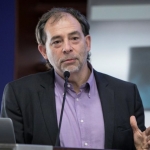
Senator Dr. Guido Girardi
The eighth lecture was given by Senator Dr. Guido Girardi, author of the Nutritional Labeling and Advertising Law, a model initiative in the Americas and the world. He has specialized in public health issues; environment and science, technology and innovation. Girardi has promoted multiple regulations on these issues, such as patient rights, pharmacological regulation, universal donor law, tobacco laws, rules on loss and waste of food, tax on junk food, among others. Between 2011 and 2012 he was President of the Senate of the Republic of Chile and during 2017 the Vice President of the Upper Chamber. He currently chairs the Environmental Committee and the Future Commission of the Senate. As part of the Future Commission, he created and promoted the Congress of the Future, the largest Science, Technology and Innovation event in Latin America. Watch a video of the award presentation here.
Read Dr. Girardi’s lecture:
Dr. Tabaré Vázquez Lecture

Dr. Tabaré Vázquez
The seventh lecture was given by Dr. Tabaré Vázquez, President of the Oriental Republic of Uruguay, with a focus on tobacco control. In Uruguay, adolescent tobacco consumption has gone down from 30% to only 9 % in just 10 years. Additionally, since the implementation of 100% smokefree laws in 2006, the rate of hospital admissions related to heart attacks has been reduced by 22%.
Dr. Michelle Bachelet Lecture

Dr. Michelle Bachelet
The sixth lecture was given by Dr. Michelle Bachelet, Chile’s ex-President and ex-Minister of Health, the Science of Peace Award for her dedication and commitment in the fight against non-communicable diseases through the implementation of health policies. Her presentation focused on early intervention to reduce chronic diseases.
Read Dr. Bachelet’s lecture:
Sir George A. O. Alleyne Lecture
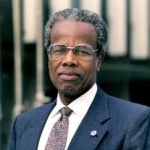
Sir George A. O. Alleyne
The fourth lecture was given by Sir George Alleyne, Chancellor of the University of West Indies, Barbados. In addition, he serves on the Task Force on Health Care in the Caribbean and is a Special Envoy to combat HIV in the Caribbean.. His presentation, Peace, Pandemics and Pluralism, focused on the societal causes of chronic diseases.
Read Dr. Alleyne’s lecture:
Dr. Bartolomé Finizola Lecture

Dr. Bartolomé Finizola
The third lecture was given by Dr. Bartolomé Finizola, Medical Director of ASCARDIO, Barquisimeto Venezuela and current president of Venezuelan Society of Cardiology, in Lima, Perú, April 2007, during the XXI Interamerican and Peruvian Congress of Cardiology. His presentation focused on ethics, financial and management conflicts where Cardiovascular Health is involved.
Read Dr. Finizola’s lecture:
Dr. Herman E. Schargrodsky Lecture
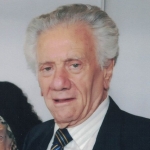
Dr. Herman Schargrodsky
The second lecture was given by Dr. Herman E. Schargrodsky, of the Italian Hospital of Buenos Aires and Principal Investigator of the CARMELA Study, in Cancun, México, on February 1, 2006, during the Interamerican Congress of Cardiology. His presentation focused on health inequities and the importance of understanding the epidemiological situation of Latin America to address the epidemic of heart diseases and stroke.
Read Dr. Schargrodsky’s lecture:
Dr. Salim Yusuf Lecture

Dr. Salim Yusuf
The first lecture was given by Dr. Salim Yusuf on October, 2003, in Toronto, Canada at the Interamerican Congress of Cardiology meeting. It focused on violence and war and the incongruity of human priorities.
Read Dr. Yusuf’s lecture:

